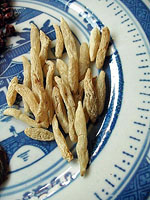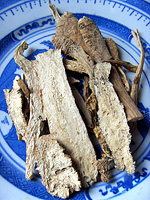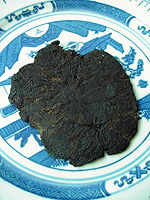|
Occasional coughing is normal. It keeps the lungs and airways free from mucus and foreign substances that might interfere with breathing. Any cough that lasts two months or longer is defined as a chronic cough and requires medical attention, even if the cough only appears in morning, at night or at certain times of the year.
A chronic cough is associated with health problems like respiratory infections, postnasal drip, asthma, acid reflux, foreign bodies, tumors in the airways and certain medications. These coughs can be relieved once the underlying causes are eliminated. However, some chronic and persistent coughs are difficult to diagnose, causing problems for treatment, which becomes a process of trial and error.
Traditional Chinese medicine (TCM) has extensive experience in treating coughs, not just as "symptom relief" but the healing of the underlying condition. The cough remedies can work with conventional approaches in treating the primary problems.
In the TCM perspective, chronic coughs are associated with dysfunction of the internal organs, such as the lungs themselves or other organs involving the lung. Chronic cough is a complex disorder that may require some time to recover from. TCM principles for the treatment of chronic coughs are:
- Regulate the lungs and other involved organs by methods like invigorating the spleen or kidney, nourishing the lungs or soothing the liver.
- As organ dysfunction tend to generate pathogens internally, an elimination process like clearing fire or heat, expelling dampness and dissolving phlegm is necessary.
- Soothe the throat or airways and enable them to resume their normal secretions.
 |
 |
 |
Dwarf lily-turf tuber |
fourleaf ladybell root |
rehmannia root |
Generally, there is no exclusive remedy for all coughs. Each remedy is tailored to the individual, and adjustments during the course of treatment are not uncommon. Herbal remedies are recommended be taken in the form of decoctions, so that the ingredients in the decoctions can be modified, increased or decreased on a daily basis, allowing physicians to tailor treatment to the patient's changing condition.
By applying the four examination techniques, TCM physicians diagnose a disharmony pattern, which reflects the pathological changes and provides guidelines for choosing remedies. Below are the common disharmony patterns in chronic coughs, just clicks the links below and see the herbal remedies.
For chronic coughs that tend to have flare up from time to time, continuous treatment during the remission period can effectively reduce the attacks of coughing as well as the severity of the symptoms, TCM physicians usually focus on invigorating the spleen and kidneys during this time.
|